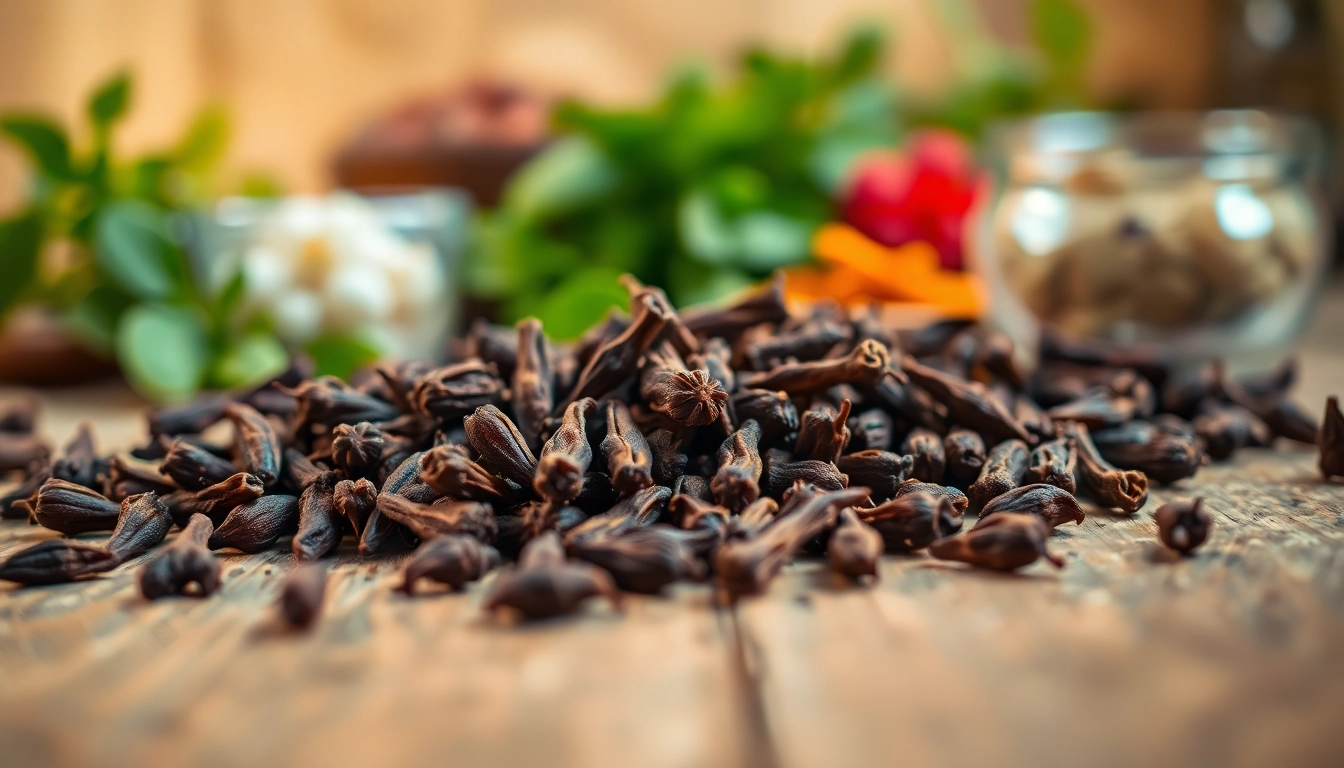Introduction to Cloves: History and Characteristics
Cloves, the aromatic flower buds harvested from the Syzygium aromaticum tree, have been cherished for their unique flavor and potent medicinal properties for centuries. Native to the Maluku Islands, also known as the Moluccas in Indonesia, cloves were a prized spice that shaped global trade routes and culinary practices. Not only are they an integral part of many cuisines, but they are also renowned for their versatility in various applications, including its uses in cloves essential oils and cosmetics.
The Origin of Cloves and Their Culinary Journey
Cloves have a rich history that stretches back over 2,000 years, predominantly in the East Indian archipelago where they originated. The spice was so valuable during ancient times that it was often traded for gold, leading to conflicts between traders and colonial powers. Cloves were introduced to Europe by Arab traders in the Middle Ages and became a central ingredient in the development of various European culinary traditions.
Over time, cloves spread across the globe, finding their way into the kitchens of both high-end restaurants and home cooks due to their intense aromatic nature and complex taste profile. Today, they remain a quintessential spice in holiday recipes, particularly in baked goods and savory dishes worldwide.
Distinct Features of Cloves: Taste and Aroma
The taste of cloves can be described as warm, sweet, and slightly bitter with a unique fragrance that is both spicy and aromatic. This complex flavor profile is due in large part to eugenol, the primary component of clove oil, which serves as a natural anesthetic and antiseptic. This compound is responsible for the distinct aroma that clove enthusiasts adore. When used in cooking, they offer a depth of flavor that can enhance both sweet and savory dishes alike.
Cultural Significance of Cloves in Global Cuisine
Cloves have embedded themselves deeply into various culinary traditions. In Indian cooking, they form a critical part of garam masala, adding complexity to spicy dishes. The use of cloves is prevalent in Middle Eastern cuisine, particularly in rice dishes, where they help create an aromatic base. In Western cultures, cloves are often associated with warmth and comfort, finding their way into gingerbread, pumpkin pie, and spiced beverages like mulled wine.
Moreover, cloves hold significant cultural meanings in different regions, symbolizing hospitality in some cultures while being integrated into festivals and rituals in others. Their prominence from Asia to Europe and beyond highlights their universal appeal and multifaceted uses.
Health Benefits of Cloves: A Nutritious Spice
Beyond their culinary applications, cloves are packed with a variety of nutrients and health benefits. Their popularity in traditional medicine can be attributed to several compounds that exhibit anti-inflammatory, antimicrobial, and antioxidant properties.
Essential Nutrients Found in Cloves
Cloves are an excellent source of antioxidants and micronutrients, including vitamins C and K, manganese, calcium, and magnesium. These nutrients are crucial for maintaining overall health and supporting various bodily functions. Manganese, in particular, is known for its vital role in bone health and metabolism, while vitamin C boosts the immune system. Studies suggest that regular consumption of cloves may help mitigate oxidative stress, a condition linked to several chronic diseases.
How Cloves Contribute to Improved Health
The health benefits of cloves extend into several areas:
- Anti-inflammatory properties: Cloves have been shown to reduce inflammation, making them beneficial for conditions like arthritis.
- Digestive health: Cloves can help stimulate digestive enzymes, enhancing gut health and alleviating issues like nausea and gas.
- Antimicrobial effects: Clove oil has demonstrated capability in fighting against bacteria, fungi, and parasites, making it a natural remedy for oral health, particularly in alleviating toothaches.
- Blood sugar control: Some studies indicate that cloves may help regulate blood sugar levels, which is beneficial for those with diabetes.
- Boosting immunity: The antioxidants in cloves can assist in sustaining immune function and fighting off infections.
Potential Risks and Considerations When Consuming Cloves
While cloves offer numerous health benefits, it’s essential to note that they should be consumed in moderation. Some potential risks include:
- Allergic reactions: Some individuals may experience allergic responses to cloves or clove oil.
- Medication interactions: Due to their anticoagulant properties, cloves may interact with blood thinners, increasing bleeding risk.
- Digestive discomfort: High amounts of cloves may lead to stomach irritation or nausea, particularly for those with sensitive digestive systems.
Always consult a healthcare provider before adding cloves in concentrated forms or supplements to your diet, particularly if you have existing health issues or are pregnant.
Cooking with Cloves: Creative Culinary Uses
Cloves’ distinctive flavor makes them a versatile ingredient, suitable for various culinary applications that range from savory dishes to sweet treats.
Incorporating Cloves into Savory Dishes
In savory dishes, cloves can enhance the depth and flavor profile of a meal. Incorporating whole cloves into stews, curries, and marinades can add warmth and smokiness. A classic example is Indian biryani, where cloves form part of the spice blend that provides aromatic pleasure to the dish.
Another creative use of cloves is in braised meats and vegetable dishes, where they infuse rich flavor. A simple beef stew, for instance, can benefit from the addition of a few whole cloves for complexity. Just be sure to remove them before serving, as their intense flavor can become overwhelming if consumed whole.
Infusing Beverages and Sweets with Cloves
Cloves are popular in various beverages, particularly warm drinks such as chai tea and spiced cocktails. Infusing them in steaming milk or water can create delightful warm beverages. You can also experiment with infusing cloves into homemade syrups or crafting a signature cocktail by muddling them with citrus and spirits.
In terms of desserts, cloves find a home in rich spiced cakes, cookies, and even fruit compotes. Classic wintertime treats like gingerbread cookies are incomplete without the warm flavor of cloves, which complement the sweetness and spice beautifully.
Unique Recipes Highlighting Cloves as a Star Ingredient
For those looking to expand their culinary repertoire, here are a few unique recipes that highlight cloves:
- Clove-Infused Honey: Warm honey over low heat and add whole cloves, allowing it to steep and infuse for a sweet, aromatic drizzle over pastries or tea.
- Spiced Apple Compote: Cook diced apples with cloves, cinnamon, and a touch of sugar for a warm side or a topping for desserts.
- Clove-Studded Ham: Stud a ham with whole cloves before baking to release a sweet, savory flavor profile, especially great for holiday meals.
Consider incorporating cloves creatively into your culinary creations, allowing their aromatic qualities to elevate your dishes.
Choosing the Best Cloves: Quality and Selection
When it comes to purchasing cloves, understanding the different qualities and types of cloves available is vital for ensuring both taste and health benefits.
Understanding Different Types of Cloves
There are essentially two main varieties of cloves available in the market: Indonesian cloves, which are typically larger with a strong flavor, and Chinese cloves, which are generally smaller and less aromatic. Depending on the culinary application, the choice between these types can influence the dish significantly. For example, Indonesian cloves are preferred in regions where robust flavor is desired, while Chinese cloves may suit more subtle dishes.
Look for whole cloves that are dark brown, firm, and with a pungent aroma. Avoid cloves that have a weak scent or those that appear to have lost their color, as these may indicate lower quality.
Where to Buy Quality Cloves: Tips and Recommendations
For the best quality, purchase cloves from reputable spice retailers or specialty shops where you can find whole, organic cloves. Online grocery stores can also be an excellent source, but be wary of purchasing from sources that do not guarantee freshness.
While shopping, consider the packaging. Whole cloves should ideally be sold in airtight containers to preserve their aroma and flavor. It’s also beneficial to check for expiration dates, ensuring you’re buying fresh spices.
Storing Cloves: Maximizing Freshness and Flavor
To keep your cloves fresh and flavorful, store them in a cool, dark place away from moisture. An airtight glass jar is ideal for maintaining their potency. Whole cloves typically retain their flavor longer than ground cloves, so consider purchasing them whole and grinding as needed for maximum freshness. Properly stored, whole cloves can last for several years, providing lasting aromatic flavors to your culinary endeavors.
Conclusion: Embracing Cloves in Everyday Life
As we explore the multifaceted world of cloves, it becomes clear that this spice offers much more than just flavor. With its rich history, health benefits, and culinary versatility, cloves can easily find a place in every kitchen.
Reinventing Traditional Recipes with Cloves
Cloves provide an opportunity to enhance traditional recipes. Experimenting with this spice can lead to discovering new flavor profiles that modernize and elevate classic dishes. From savory to sweet, the ways to integrate cloves into everyday cooking are virtually endless.
The Future of Cloves in Modern Cuisine
As culinary trends continue to evolve, cloves’ role in modern cuisine may become even more pronounced. The rise of plant-based diets and the focus on natural flavors could encourage the use of spices like cloves, promoting creativity in kitchens everywhere. Additionally, innovations in cooking techniques may enhance the flavor infusion of cloves, making them a sought-after ingredient in contemporary gastronomy.
Inviting Cloves into Your Kitchen: Final Thoughts
Incorporating cloves into your daily cooking routines can not only enhance the flavor of your dishes but also contribute to better health. With their richness in nutrients and historical significance, they are truly a spice worth celebrating. By embracing cloves and their unique qualities, you can transform ordinary meals into extraordinary culinary experiences.



